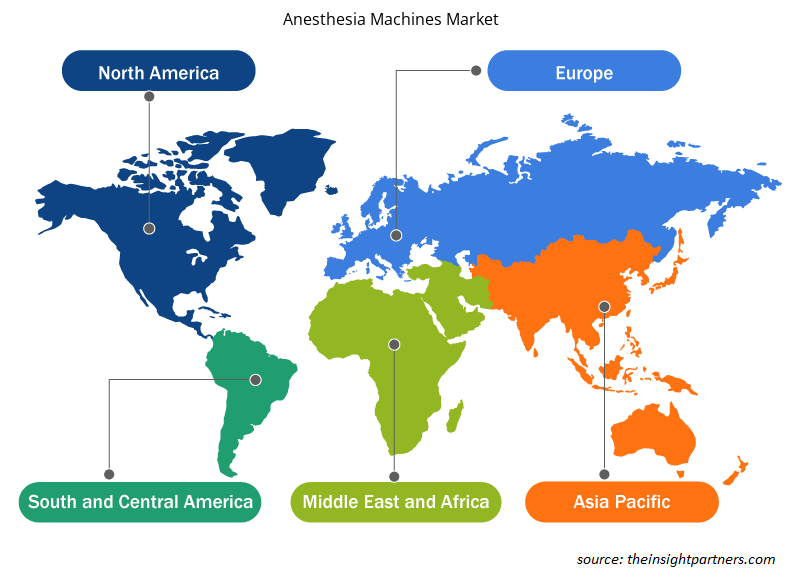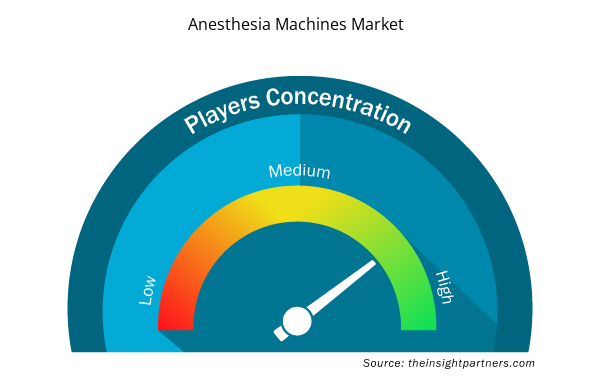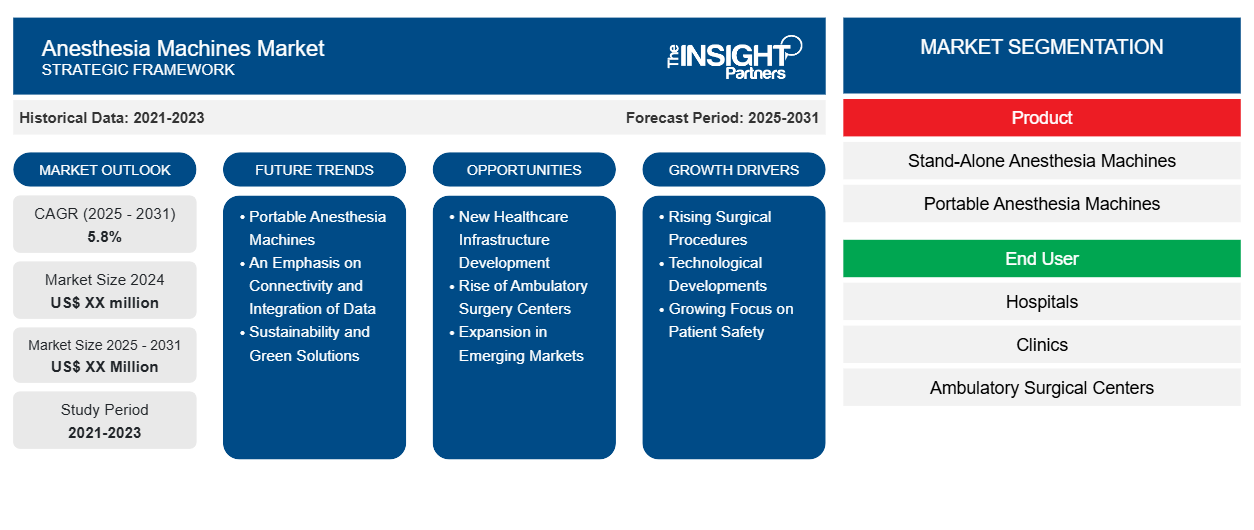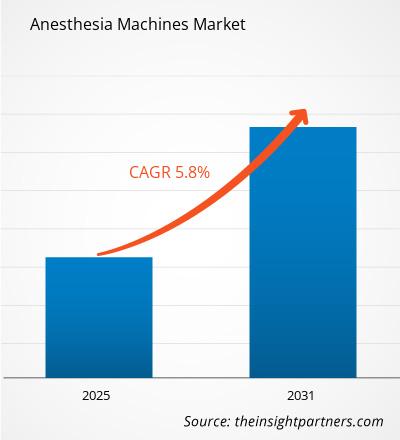麻酔機器市場は、2024年から2031年にかけて5.8%のCAGRで成長し、市場規模は2024年のXX百万米ドルから2031年にはXX百万米ドルに拡大すると予想されています。
レポートは、製品(スタンドアロン麻酔器、ポータブル麻酔器)別にセグメント化されています。さらに、エンドユーザー(病院、診療所、外来手術センター)に基づいてセグメント化されています。グローバル分析は、地域レベルと主要国でさらに細分化されています。レポートでは、上記の分析とセグメントの値をUSDで提供しています。
報告書の目的
The Insight Partners による麻酔機器市場レポートは、現在の状況と将来の成長、主な推進要因、課題、機会を説明することを目的としています。これにより、次のようなさまざまなビジネス関係者に洞察が提供されます。
- テクノロジープロバイダー/メーカー: 進化する市場の動向を理解し、潜在的な成長機会を把握することで、情報に基づいた戦略的意思決定が可能になります。
- 投資家: 市場の成長率、市場の財務予測、バリュー チェーン全体に存在する機会に関する包括的な傾向分析を実施します。
- 規制機関: 市場の濫用を最小限に抑え、投資家の信用と信頼を維持し、市場の完全性と安定性を維持することを目的として、市場における政策と警察活動を規制します。
麻酔器市場のセグメンテーション
製品
- 独立型麻酔器
- ポータブル麻酔器
エンドユーザー
- 病院
- クリニック
- 外来手術センター
要件に合わせてレポートをカスタマイズする
このレポートの一部、国レベルの分析、Excelデータパックなど、あらゆるレポートを無料でカスタマイズできます。また、スタートアップや大学向けのお得なオファーや割引もご利用いただけます。
- このレポートの主要な市場動向を入手してください。この無料サンプルには、市場動向から見積もりや予測に至るまでのデータ分析が含まれます。
麻酔機器市場の成長要因
- 外科手術の増加: 麻酔器市場のもう一つの重要な推進力は、世界中で行われる手術の数です。医療システムの発展と人口の増加により、必要な処置はますます手術的になり、信頼できる麻酔器の必要性が高まっています。その結果、安全で効率的な麻酔器の需要が高まり、あらゆる医療現場で市場の成長が加速します。
- 技術開発: 麻酔の技術進歩のスピードは市場に大きな影響を与えます。統合麻酔の監視に役立つインテリジェント麻酔機器の技術進歩により、安全性が向上し、プロセスが簡素化されます。技術の向上により、手術を受ける患者の治療結果が向上し、医療提供者は新しい麻酔機器への投資を迫られています。
- 患者の安全に対する関心の高まり: 患者の安全と快適性に対する関心の高まりが、麻酔器市場の原動力となっています。このような治療のリスクを軽減する高度な麻酔ソリューションは、病院や手術センターの注目の的となっています。患者ケアの強化に対するこのような関心は、最新の安全機能をすべて組み込んだ高度な麻酔器の需要を促進するでしょう。
麻酔器市場の将来動向
- ポータブル麻酔器: 最近では、移動手術や遠隔地での手術に対応するというトレンドにより、ポータブル麻酔器が普及しつつあります。これらの軽量で小型の機器は、さまざまな状況で適切な麻酔を確実に提供し、手術ケアへのアクセスを向上させるために人々にとって便利です。その汎用性は、特に医療サービスが行き届いていない地域で、医療提供者の注目を集めています。
- データの接続性と統合を重視: 麻酔機器市場におけるトレンドの拡大 電子健康記録やモニタリング システムへの接続、シームレスでより優れたデータ交換を可能にするデバイス、患者管理の改善は、データの接続性と統合に関するトレンドの全体的な改善に貢献しています。ワークフローの効率化と患者への結果の向上に重点が置かれるようになったことで、統合ソリューションの面でより望ましいものになっています。
- 持続可能性とグリーン ソリューション: 企業が環境に優しい素材やより優れた実践の革新を模索するにつれて、麻酔機器市場では持続可能性ソリューションの影響力が高まっています。再利用性、廃棄物の削減、廃棄物の発生抑制といった側面が徐々に取り入れられています。環境責任に対するこのアプローチは優れた相乗効果を生み、医療提供者を臨床現場においてより環境に優しい麻酔ソリューションへと駆り立てます。
麻酔機器の市場機会
- 新しい医療インフラの開発: 医療インフラの増加は、特に発展途上国において麻酔機器市場の成長の重要な要因となると考えられています。新しい病院や手術センターが建設されるにつれて、最新の麻酔機器の需要が高まります。これにより、メーカーは、拡張医療施設の新たな要件を満たすために新しい市場に参入するかなりのチャンスが得られます。
- 外来手術センターの台頭: 外来手術センター (ASC) の発展は、麻酔器にとって最大のチャンスです。外来患者で行われる手術が一般的になり、準備時間が大幅に短縮されているため、コンパクトで効率的な麻酔システムの需要も高まっています。このため、メーカーは ASC の厳密に定義されたニーズを満たす特別な機械を設計するようになっています。
- 新興市場への拡大: 新興市場では、ヘルスケアに巨額の投資が行われています。つまり、麻酔器メーカーにとって、ほぼ絶え間なくチャンスが生まれているということです。これらの地域でのヘルスケア インフラの改善への投資は、ハイエンドの麻酔ソリューションに対する需要が高まっていることを意味します。企業は、拡大する医療インフラの要件を満たす、コスト効率の高い高品質の機器を製造することで、このようなチャンスを実現できます。
麻酔器市場の地域別分析
予測期間を通じて麻酔機器市場に影響を与える地域的な傾向と要因は、Insight Partners のアナリストによって徹底的に説明されています。このセクションでは、北米、ヨーロッパ、アジア太平洋、中東およびアフリカ、南米および中米にわたる麻酔機器市場のセグメントと地理についても説明します。

- 麻酔機器市場の地域別データを入手
麻酔機器市場レポートの範囲
| レポート属性 | 詳細 |
|---|---|
| 2024年の市場規模 | XX百万米ドル |
| 2031年までの市場規模 | XX百万米ドル |
| 世界のCAGR(2025年~2031年) | 5.8% |
| 履歴データ | 2021-2023 |
| 予測期間 | 2025-2031 |
| 対象セグメント | 製品別
|
| 対象地域と国 | 北米
|
| 市場リーダーと主要企業プロフィール |
|
麻酔機器市場のプレーヤー密度:ビジネスダイナミクスへの影響を理解する
麻酔機器市場は、消費者の嗜好の変化、技術の進歩、製品の利点に対する認識の高まりなどの要因により、エンドユーザーの需要が高まり、急速に成長しています。需要が高まるにつれて、企業は提供を拡大し、消費者のニーズを満たすために革新し、新たなトレンドを活用し、市場の成長をさらに促進しています。
市場プレーヤー密度とは、特定の市場または業界内で活動している企業または会社の分布を指します。これは、特定の市場スペースに、その規模または総市場価値と比較して、どれだけの競合相手 (市場プレーヤー) が存在するかを示します。
麻酔機器市場で事業を展開している主要企業は次のとおりです。
- スミスメディカル
- ゼネラル・エレクトリック
- メドトロニック
- スペースラボヘルスケア
- ドレーゲルヴェルクAG&Co.KGaA
免責事項:上記の企業は、特定の順序でランク付けされていません。

- 麻酔機器市場のトップキープレーヤーの概要を入手
主なセールスポイント
- 包括的なカバレッジ: レポートでは、麻酔機器市場の製品、サービス、タイプ、エンドユーザーの分析を包括的にカバーし、全体的な展望を提供します。
- 専門家による分析: レポートは、業界の専門家とアナリストの深い理解に基づいてまとめられています。
- 最新情報: このレポートは、最新の情報とデータの傾向を網羅しているため、ビジネスの関連性を保証します。
- カスタマイズ オプション: このレポートは、特定のクライアント要件に対応し、ビジネス戦略に適切に適合するようにカスタマイズできます。
したがって、麻酔機器市場に関する調査レポートは、業界のシナリオと成長の見通しを解読し理解する道の先導役となる可能性があります。正当な懸念事項がいくつかあるかもしれませんが、このレポートの全体的な利点は欠点を上回る傾向があります。
- 過去2年間の分析、基準年、CAGRによる予測(7年間)
- PEST分析とSWOT分析
- 市場規模価値/数量 - 世界、地域、国
- 業界と競争環境
- Excel データセット



Report Coverage
Revenue forecast, Company Analysis, Industry landscape, Growth factors, and Trends

Segment Covered
This text is related
to segments covered.

Regional Scope
North America, Europe, Asia Pacific, Middle East & Africa, South & Central America

Country Scope
This text is related
to country scope.
よくある質問
The rising surgical procedures and growing focus on patient safety are the major factors boosting the anesthesia machines market growth.
North America region accounts for highest revenue share in anesthesia machines market.
Asia Pacific is estimated to grow at the highest CAGR over the forecast period (2023 - 2031).
The anesthesia machines market is expected to grow at a CAGR of 5.8%.
The final report will duly include market size and projection estimates for all the segments from 2021 to 2031, along with a revenue share and compound annual growth rate (%) for the regional/country-wise market wherein 2021-2022 are the historic years, 2023 is considered to be the base year, and the forecast will be provided till 2031, along with CAGR (%).
Smiths Medical, GE Healthcare, and Medtronic are the major companies operating in the anesthesia machines market.
Trends and growth analysis reports related to Life Sciences : READ MORE..
The List of Companies
1. Smiths Medical
2. GENERAL ELECTRIC
3. Medtronic
4. Spacelabs Healthcare
5. Drägerwerk AG & Co. KGaA
6. BEIJING AEONMED CO., LTD.
7. HEYER Medical AG
8. Oricare, Inc.
9. BD
10. Supera Anesthesia Innovations
The Insight Partners performs research in 4 major stages: Data Collection & Secondary Research, Primary Research, Data Analysis and Data Triangulation & Final Review.
- Data Collection and Secondary Research:
As a market research and consulting firm operating from a decade, we have published and advised several client across the globe. First step for any study will start with an assessment of currently available data and insights from existing reports. Further, historical and current market information is collected from Investor Presentations, Annual Reports, SEC Filings, etc., and other information related to company’s performance and market positioning are gathered from Paid Databases (Factiva, Hoovers, and Reuters) and various other publications available in public domain.
Several associations trade associates, technical forums, institutes, societies and organization are accessed to gain technical as well as market related insights through their publications such as research papers, blogs and press releases related to the studies are referred to get cues about the market. Further, white papers, journals, magazines, and other news articles published in last 3 years are scrutinized and analyzed to understand the current market trends.
- Primary Research:
The primarily interview analysis comprise of data obtained from industry participants interview and answers to survey questions gathered by in-house primary team.
For primary research, interviews are conducted with industry experts/CEOs/Marketing Managers/VPs/Subject Matter Experts from both demand and supply side to get a 360-degree view of the market. The primary team conducts several interviews based on the complexity of the markets to understand the various market trends and dynamics which makes research more credible and precise.
A typical research interview fulfils the following functions:
- Provides first-hand information on the market size, market trends, growth trends, competitive landscape, and outlook
- Validates and strengthens in-house secondary research findings
- Develops the analysis team’s expertise and market understanding
Primary research involves email interactions and telephone interviews for each market, category, segment, and sub-segment across geographies. The participants who typically take part in such a process include, but are not limited to:
- Industry participants: VPs, business development managers, market intelligence managers and national sales managers
- Outside experts: Valuation experts, research analysts and key opinion leaders specializing in the electronics and semiconductor industry.
Below is the breakup of our primary respondents by company, designation, and region:

Once we receive the confirmation from primary research sources or primary respondents, we finalize the base year market estimation and forecast the data as per the macroeconomic and microeconomic factors assessed during data collection.
- Data Analysis:
Once data is validated through both secondary as well as primary respondents, we finalize the market estimations by hypothesis formulation and factor analysis at regional and country level.
- Macro-Economic Factor Analysis:
We analyse macroeconomic indicators such the gross domestic product (GDP), increase in the demand for goods and services across industries, technological advancement, regional economic growth, governmental policies, the influence of COVID-19, PEST analysis, and other aspects. This analysis aids in setting benchmarks for various nations/regions and approximating market splits. Additionally, the general trend of the aforementioned components aid in determining the market's development possibilities.
- Country Level Data:
Various factors that are especially aligned to the country are taken into account to determine the market size for a certain area and country, including the presence of vendors, such as headquarters and offices, the country's GDP, demand patterns, and industry growth. To comprehend the market dynamics for the nation, a number of growth variables, inhibitors, application areas, and current market trends are researched. The aforementioned elements aid in determining the country's overall market's growth potential.
- Company Profile:
The “Table of Contents” is formulated by listing and analyzing more than 25 - 30 companies operating in the market ecosystem across geographies. However, we profile only 10 companies as a standard practice in our syndicate reports. These 10 companies comprise leading, emerging, and regional players. Nonetheless, our analysis is not restricted to the 10 listed companies, we also analyze other companies present in the market to develop a holistic view and understand the prevailing trends. The “Company Profiles” section in the report covers key facts, business description, products & services, financial information, SWOT analysis, and key developments. The financial information presented is extracted from the annual reports and official documents of the publicly listed companies. Upon collecting the information for the sections of respective companies, we verify them via various primary sources and then compile the data in respective company profiles. The company level information helps us in deriving the base number as well as in forecasting the market size.
- Developing Base Number:
Aggregation of sales statistics (2020-2022) and macro-economic factor, and other secondary and primary research insights are utilized to arrive at base number and related market shares for 2022. The data gaps are identified in this step and relevant market data is analyzed, collected from paid primary interviews or databases. On finalizing the base year market size, forecasts are developed on the basis of macro-economic, industry and market growth factors and company level analysis.
- Data Triangulation and Final Review:
The market findings and base year market size calculations are validated from supply as well as demand side. Demand side validations are based on macro-economic factor analysis and benchmarks for respective regions and countries. In case of supply side validations, revenues of major companies are estimated (in case not available) based on industry benchmark, approximate number of employees, product portfolio, and primary interviews revenues are gathered. Further revenue from target product/service segment is assessed to avoid overshooting of market statistics. In case of heavy deviations between supply and demand side values, all thes steps are repeated to achieve synchronization.
We follow an iterative model, wherein we share our research findings with Subject Matter Experts (SME’s) and Key Opinion Leaders (KOLs) until consensus view of the market is not formulated – this model negates any drastic deviation in the opinions of experts. Only validated and universally acceptable research findings are quoted in our reports.
We have important check points that we use to validate our research findings – which we call – data triangulation, where we validate the information, we generate from secondary sources with primary interviews and then we re-validate with our internal data bases and Subject matter experts. This comprehensive model enables us to deliver high quality, reliable data in shortest possible time.


 このレポートの無料サンプルを入手する
このレポートの無料サンプルを入手する